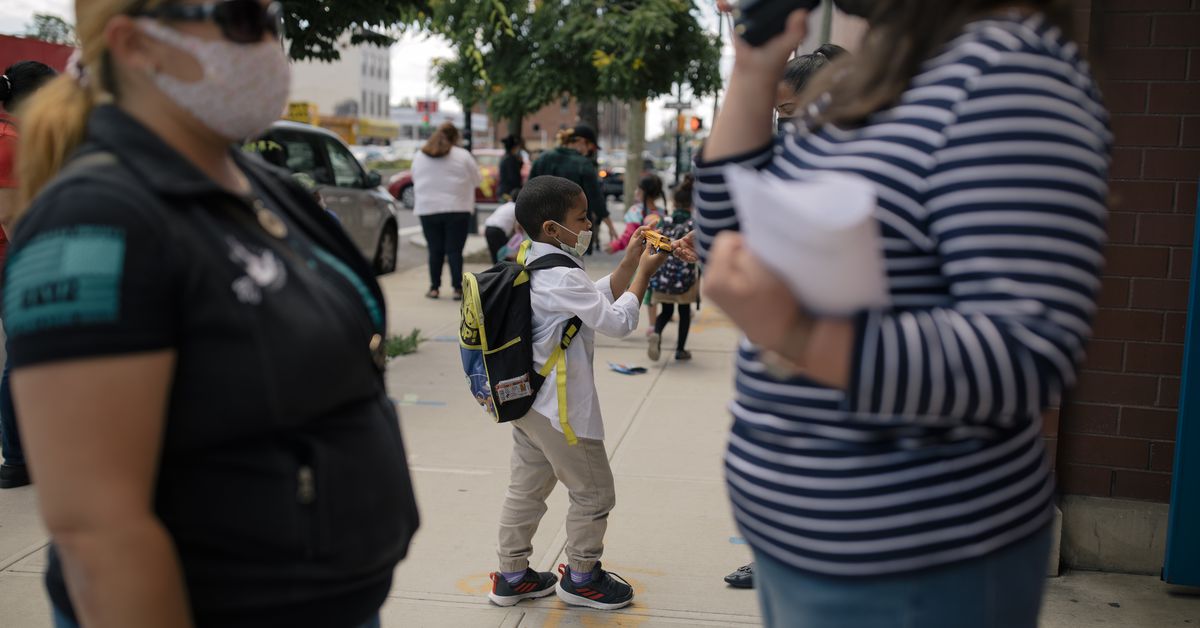Pandemic looms over education priorities for Florida Legislature
TALLAHASSEE — Florida’s schools remain in the grips of the coronavirus pandemic, nearly a year after state officials first called for campus closures and canceled spring testing.
Many struggles continue. Local school officials and education groups have raised hopes that state lawmakers will prioritize schooling issues — whether financial, social or academic — during the legislative session that starts March 2. Those priorities affect much of the Legislature’s work on the next budget because education constitutes roughly one-third of the state’s total spending annually.
Bills tackling those matters are slowly trickling out. Some Republican leaders want to address academic gaps by enhancing literacy and early learning programs. Others are looking at continuing remote learning options without impacting district funding.
“The world has changed, and we are probably going to have a lot of parents who will have the opportunity to work remotely from home, and they may want to take advantage of having their student in a virtual school option,” said Sen. Manny Diaz Jr., a Hialeah Republican who sits on the chamber’s two education-related committees .
Diaz is sponsoring legislation that would allow districts to keep receiving full funding for students in remote learning. Such funding flexibility taps into broader concerns that center on whether districts will get state funds if they continue to provide options to students.
Some Democrats have charged the Republican majority has given early priority to partisan measures that do little to address the troubles created by the health crisis. For instance, legislators have advanced ideas in the House and Senate that would expand vouchers and create education savings accounts, mandate moments of silence in public schools, add new requirements to participate in teacher unions, and exclude future teachers from a traditional pension plan.
“My hope, genuinely, is that my Republican colleagues would see that their priorities right now are not going to help our children or our teachers,” said Senate Education Vice Chairman Shevrin Jones, a West Park Democrat.
Jones is urging senators to emphasize policy that would help students who are struggling academically or proposals to encourage teachers to tutor after school.
“Put the power back into the teachers. They are really doing a lot, so give them more resources to be able to continue doing it,” Jones said.
On the ground, local school officials have asked for similar things. And, for the most part, their requests revolve around money.
Money, money, money
The main financial question gnawing at lawmakers is whether the state should fund districts based on actual student attendance counts or use some other formula for the next school year.
This year, the Legislature set its education budget based on enrollment forecasts that did not anticipate the pandemic. Even as those projections fell short, the state did not cut funding to school districts.
But the decreased numbers — nearly 88,000 fewer students statewide — did not escape the notice of House Speaker Chris Sprowls, R-Palm Harbor, or Senate President Wilton Simpson, R-Trilby. They suggested that the state would not hold districts financially harmless again if the numbers don’t rebound.
Sprowls says he wants the budget to reflect the new levels. And, he has encouraged schools to “find these missing children” to avoid budget cuts.
If students come back after the fiscal year starts, Sprowls acknowledged there is “absolutely a danger.” But, he says, that is why the House has warned all superintendents about the issue.
Simpson shared the sentiment. He also sounded optimistic that the worst might be behind the schools.
“I do think the speaker had it right about finding these kids,” Simpson told reporters on Thursday. “I do believe those 88,000 children are going to show up coming into next August, for the next fiscal budget year.”
In Miami-Dade and Broward counties, home to Florida’s largest districts, nearly 20,000 kids left the public school system. Officials said most were not “missing.”
Miami-Dade superintendent Alberto Carvalho said about 76 percent of those students attend private schools or moved out of the county. He said the district would be short $85 million if the state hadn’t funded schools at pre-pandemic enrollment levels.
As money questions loom, district officials are also seeking more flexibility on how to use their money. In recent years, the Legislature has added restrictions to how districts spend portions of their allocated funds.
“There are many issues that I don’t think require legislative solutions,” said Andrea Messina, Florida School Boards Association executive director. “We don’t need the Legislature to solve the problems that districts can solve on their own.”
Carvalho, for instance, would like the Legislature to give districts more flexibility on how to use federal money. Those dollars, he said, would go towards more digital content and technology, personal protective equipment and staff and teacher shortages.
Gov. Ron DeSantis has proposed adding $50 million more to teacher salaries, still targeting a base pay of $47,500 before addressing other levels.
Improving teacher pay, including for more veteran teachers, remains a top issue for many districts.
Many districts are also are asking lawmakers to allow schools to collect property taxes based on rising values. Lawmakers, however, have been reluctant to leave the rate unchanged as values go up, concerned it could be viewed as a tax increase.
Another money fight is brewing over the program that requires all Florida schools to have armed security.
DeSantis vetoed $41.6 million from the “guardian” program last summer. Now, it faces a $5 million deficit. Yet guardians are still being trained, and participating districts are footing the bill, said Pinellas County Sheriff Bob Gualtieri, chairman of the Marjory Stoneman Douglas High School Public Safety Commission.
“I can tell you who’s not paying for it, and that’s the sheriffs,” he said. “So, if the state doesn’t pay for it, the school districts have to pay for it.”
Eileen Long leads the Pinellas School Board’s legislative committee. She said her district’s priorities, such as adequate funding for school security and employee salaries, seemed to gain support from the local delegation, which includes Sprowls and House Education Committee Chairman Chris Latvala.
“I talk to them every week,” said Long. “Are they listening? I hope so. We’re having dialogue.”
She called for lawmakers to spend more time in schools. Maybe then they would understand the problems and issues that local officials and educators see, she said, and adjust their priorities accordingly.
Academic gaps and testing requirements
Republicans aren’t ignoring the many issues the pandemic has generated. They’ve set priorities that would enhance literacy and early learning programs to help struggling youngsters in elementary and pre-school, for instance.
House Early Learning & Elementary Education Subcommittee Chairman Vance Aloupis, R-Miami, says initiatives such as ensuring child care centers can survive are necessary for early childhood development and supporting the workforce.
“There is no question in my mind that this pandemic is going to lead to an expansion of the opportunity gap. It’s inevitable,” Aloupis said, referring to the disparity in access to quality schools and academic resources for children.
“When parents don’t have a place for their child to be during the day, whether they feel that they’re going to be safe and healthy, then it makes it very, very difficult for people to go back to work,” he added.
Part of the solution, he said, will entail investing more on prekindergarten providers to help them weather the financial constraints they have faced amid the pandemic. Most providers are private schools that accept voluntary prekindergarten funding on a per-student basis.
Sprowls is also prioritizing legislation that would offer free books to struggling readers.
Some critics say these ideas don’t go far enough to accomplish what schools are seeking.
“I think they’re focused on the wrong things,” said Andrew Spar, president of the Florida Education Association.
Lawmakers ought to be spending their time discussing how to help students and schools as they cope with the pandemic, Spar said. But they’re not talking about how to overcome learning losses or ensure that schools don’t lose too many teachers and staff, he continued.
A top legislative priority for the Hillsborough County School Board is allowing students who are learning English to take their state exams in their native language. This would give them the opportunity to meet graduation requirements, the board notes.
Diaz, however, said there may be no need to enact policy to address state testing requirements this year because the state education department is looking at the issue. The department did not immediately respond to requests for comment.
The Legislature’s trajectory on education policy has left some parties dubious.
“Their priority now seems to be to undermine teachers and undermine public schools,” Spar said.
He referred to a Senate bill that would merge the state’s scholarship and voucher programs and make them all state-funded. It would also convert the scholarships into educational savings accounts that families could use to pay for private tutoring, therapy, private school or even college savings.
“A lot of parents want to have more flexibility” after the pandemic, said Diaz, the sponsor of the bill. “I think this goes with our theme of continuing to move toward individual attention to the student.”
Sue Woltanski, who chairs the Florida School Boards Association legislative subcommittee, said her group backs measures aimed at supporting public schools. Like the teachers union, the organization views educating children during a pandemic to be the key issue — yet one lawmakers have barely addressed in committee weeks, she said.
“We, as a legislative body, should be thinking about those kids,” said Jones.
Miami Herald staff writer Colleen Wright contributed to this report.







